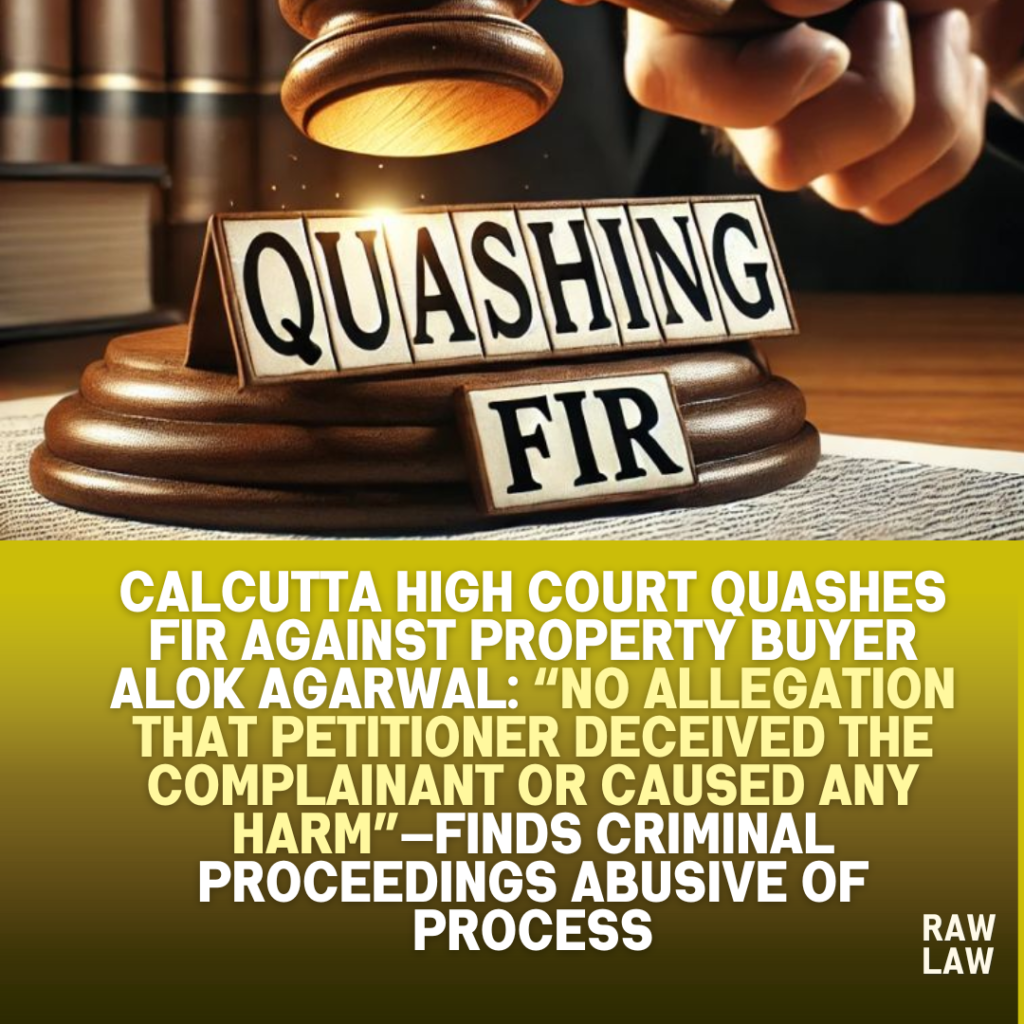Judgment Name: Alok Agarwal v. State of West Bengal & Ors.
Date: 17 June 2025
Coram: Justice Dr. Ajoy Kumar Mukherjee
Court: Calcutta High Court
Court’s Decision
The Calcutta High Court allowed the criminal revision application filed by Alok Agarwal and quashed the criminal proceedings pending against him under Sections 406, 420, and 120B of the IPC. The Court held that the allegations did not disclose any criminal offence against the petitioner, who had purchased the land through a registered sale deed after paying a substantial consideration. It found that the allegations were predominantly civil in nature and that continuation of the criminal proceedings would amount to an abuse of the process of law.
“It is hard to believe that the accused no.4/petitioner herein by purchase with valuable consideration through registered sale deed has deceived the complainant in any manner.”
Facts
The criminal proceedings originated from an FIR filed by the complainant under Section 156(3) Cr.P.C., alleging that certain accused persons, including the petitioner Alok Agarwal, had committed forgery and encroached on a piece of ancestral land situated at Mouza Gopalpur. The complainant claimed that two uncles fraudulently executed deeds dated 27 September 2018 without the knowledge or consent of the complainant or his late father and started fencing the land.
The police registered the FIR under Sections 420/406/467/468/471/120B IPC. However, the final chargesheet was filed only under Sections 406, 420, and 120B IPC, noting that no evidence was found regarding forgery.
The petitioner, who was accused no.4, was a director of a company that had purchased the disputed land by registered sale deed on 25 September 2018 after payment of ₹83.85 lakhs. The complainant had also filed a civil suit (T.S. 479/2022) seeking declaration and injunction but did not make the petitioner a party to that suit.
Issues
- Whether the FIR and subsequent criminal proceedings against the petitioner disclosed a prima facie case under Sections 406, 420, and 120B IPC.
- Whether the dispute was predominantly civil in nature.
- Whether the petitioner, being a bonafide purchaser for value, could be criminally liable in absence of any allegations of deception or dishonest inducement.
Petitioner’s Arguments
The petitioner argued through senior counsel that:
- He had purchased the property based on verified documents and was not involved in any criminal conspiracy.
- The FIR was lodged to harass him and damage his reputation and the goodwill of his company.
- Even assuming the allegations to be true, no offence under Sections 406, 420, or 120B IPC was made out.
- The allegations were civil in nature, and the criminal law was being misused.
- The complainant failed to comply with Section 154(3) Cr.P.C. before lodging the FIR, and the accompanying affidavit was defective.
- He was not a party to the civil suit and had already transferred the property to a third party.
Respondent’s Arguments
The State placed the case diary before the Court but left the decision to the discretion of the Court. The complainant was not represented during the hearing.
Analysis of the Law
Justice Mukherjee analysed the essential ingredients of Sections 406 (criminal breach of trust), 420 (cheating), and 120B (criminal conspiracy) IPC and found that:
- There was no entrustment of property to the petitioner, which is a necessary ingredient under Section 406.
- The petitioner was not alleged to have deceived or induced the complainant to part with any property or suffer harm—thereby failing the test under Section 420.
- There was no meeting of minds or agreement to commit a crime, which is essential under Section 120B IPC.
The Court observed:
“The complainant is not the purchaser… it is not understandable how the present petitioner/accused no.4 has deceived the FIR maker… nor how the sale deed caused any damage or harm to him.”
Precedent Analysis
While the judgment did not cite specific case law, it adhered to settled principles laid down by the Supreme Court on the limited scope of criminal proceedings in cases involving civil disputes. The reasoning closely aligns with landmark judgments such as:
- State of Haryana v. Bhajan Lal: On when criminal proceedings can be quashed to prevent abuse of process.
- G. Sagar Suri v. State of UP: On distinguishing civil disputes from criminal offences.
Court’s Reasoning
The Court observed that the petitioner had purchased the land from other accused persons via a registered sale deed after paying full consideration. There was no material in the FIR or the case diary suggesting that he had acted fraudulently or conspired with others. The Court also found it significant that the company in whose name the property was purchased was not made a party to the proceedings.
It held that continuing the proceedings would be an abuse of the process of court as:
- No ingredient of the alleged offences was satisfied.
- The complainant had not even alleged that the petitioner made any false representation or induced him dishonestly.
- The case diary and 161 Cr.P.C. statements did not indicate criminality on part of the petitioner.
Conclusion
The Court allowed the revision petition and quashed the proceedings against the petitioner, holding that the continuation of proceedings would be a futile exercise and misuse of criminal law. It held:
“The chance of conviction of the present petitioner at the end of trial with the aforesaid materials is bleak.”
Implications
This judgment reinforces the principle that criminal law cannot be invoked in cases of purely civil disputes. It affirms the protection available to bonafide purchasers for value and warns against indiscriminate initiation of criminal proceedings in property matters. It also highlights the importance of adhering to procedural safeguards under Cr.P.C., including proper affidavit verification under Section 154(3).



